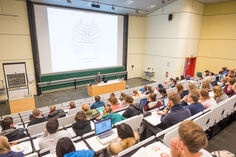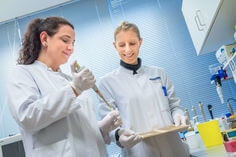Research Consortia
Research at the Medical Faculty Heidelberg is characterized by a high degree of interdisciplinarity across departmental and institutional boundaries, particularly between clinical research and basic research.
The Medical Faculty specializes in the following research areas
- Cardiovascular medicine
- Neurosciences
- Translational and individualized oncology
- Infectiology
Other strong areas of research at the Faculty include lung research and research in the field of metabolic diseases. Areas such as digital health, artificial intelligence, robotics, bioinformatics and medical informatics as well as global health and prevention have also become important research fields in the Faculty’s profile, and will continue to be further developed in the future.
The Medical Faculty Heidelberg leads and takes part in numerous DFG-funded Collaborative Research Centers, Research Training Groups, Research Units and Clinical Research Units that represent these overarching priorities, as well as high-ranking BMBF and EU-funded consortia.
DFG-funded joint projects
Collaborative Research Centers (SFBs) und CRC-Transregios
- CRC 1129: Integrative analysis of Pathogen Replication and Spread
Spokesperson: Prof. Hans-Georg Kräusslich, Center for Infectiology - CRC 1158: Heidelberg Pain Consortium
Spokesperson: Prof. Dr. Rohini Kuner, Institute of Pharmacology - CRC 1324: Mechanisms and functions of Wnt signalling
Spokesperson: Prof. Dr Michael Boutros, Institute of Human Genetics - CRC 1389: Unite Glioblastoma: Understanding and Targeting Resistance in Glioblastoma
Spokesperson: Prof. Dr Wolfgang Wick, Clinic for Neurology - CRC 1550: Molecular Circuits of Heart Disease
Spokesperson: Prof. Dr Johannes Backs, Internal Medicine VIII: Institute of Experimental Cardiology - CRC 1638: Cellular membrane remodeling – how changing form creates function
Spokesperson: Professor Dr Michael Meinecke, Biochemistry Centre (BZH) - CRC 1709: Cellular Plasticity in Malignant Myeloid Diseases - From Mechanism to Therapy
Spokesperson: Prof. Dr Carsten Müller-Tidow, Internal Medicine V: Hematology, Oncology and Rheumatology - CRC-TRR 156: The Skin as Sensor and Effector Organ Orchestrating Local and Systemic Immune Responses (Heidelberg, Tübingen, Mainz)
Spokesperson: Prof. Dr Alexander Enk, Department of Dermatology - CRC-TRR 179: Determinants and dynamics of elimination versus persistence of hepatitis virus infection (Heidelberg, Freiburg, Munich)
Spokesperson: Prof. Dr Ralf Bartenschlager, Center for Infectiology
The Medical Faculty participates in the following Collaborative Research Centers:
- CRC 1261: Magnetoelectric Sensors: From Composite Materials to Biomagnetic Diagnostics
- CRC 1328: Adenine Nucleotides in Immunity and Inflammation
- CRC 1381: Dynamic Orgazisation of Cellular Protein Machineries: From Biogenesis and Modular Assembly to Function
- CRC 1436: Neuronal Resources of Cognition
- CRC 1531: Damage Control by the Stroma-Vascular Compartment
- CRC-TRR 152: TRiPs to Homeostasis by Transient Receptor Potential Channel Modules
- CRC-TRR 186: Molecular Switches: Spatio-temporal Control of Cellular Signal Transmission
- CRC-TRR 237: Nucleic Acid Immunity
- CRC-TRR 319: RMaP: RNA Modification and Processing
- CRC-TRR 379: Neuropsychobiology of Aggression: A Transdiagnostic Approach to Mental Disorders
- CRC-TRR 384: Inhibitory Neurons: Shaping the Cortical Code (IN-CODE)
Research Training Groups
The Medical Faculty participates in the following Research Training Groups:
- GRK 2727: Innate Immune Checkpoints in Cancer and Tissue Damage (InCheck)
- GRK 2751: Inflammatory cues as modulators of early pancreatic carcinogenesis (InCuPanC)
- GRK 2761: Seamless integration of assistance systems for natural locomotion of humans (LokoAssist)
- GRK 2840: Ambivalent Enmity: Dynamics of Antagonism in Asia, Europe, and the Middle East
Research Groups
- FOR 2599: Tissue type 2 responses: Mechanisms of induction and regulation
Spokesperson: Prof. Dr Axel Roers, Immunology - FOR 2936: Climate Change and Health in Sub-Saharan Africa
Spokesperson: Prof. Ina Danquah, Heidelberg Institute for Global Health
The Medical Faculty participates in the following Research Groups:
- FOR 2407: Exploring Articular Cartilage and Subchondral Bone Degeneration and Regeneration in Osteoarthritis (ExCarBon)
- FOR 2509: The concert of dolichol-based glycosylation: from molecules to disease models
- FOR 2848: Nanoscale Architecture and Heterogeneity of the Mitochondrial Inner Membrane
- FOR 3031: NORMAL#VERRÜCKT Contemporary history of an eroding difference
- FOR 5146: Defining the osteohepatic axis in the context of iron homeostasis - FerrOs
- FOR 5705: NeuroFlame – Defence and demise of inflamed neurons
- FOR 5815: Structural and functional lipid droplet heterogeneity
Clinical research groups
Priority Programs
The Medical Faculty Heidelberg participates in the following Priority Programs:
- SPP 2084: µBONE: Colonization and interaction of tumor cells within the bone microenvironment
- SPP 2306: Ferroptosis: from Molecular Basics to Clinical Applications
- SPP 2392: Visual communication. Theoretical, empirical, and applied perspectives (ViCom)
- SPP 2395: Local and Peripheral Drivers of Microglial Diversity and Function
- SPP 2453: Integration of mitochondria into the cellular proteostasis network
BMFTR-funded joint projects
Scientists at the Medical Faculty Heidelberg are involved in numerous projects and consortia funded by the Federal Ministry of Research, Technology and Space (BMFTR). Scientists at the Medical Faculty Heidelberg are involved in numerous projects and consortia funded by the Federal Ministry of Research, Technology and Space (BMFTR), such as:
- German Center for Infection Research (DZIF / Heidelberg site)
- German Center for Cardiovascular Research (DZHK)
- German Center for Lung Research (DZL)
- German Consortium for Translational Cancer Research (DKTK)
- German Center for Mental Health (DZPG)
- German Center for Diabetes Research (DZD) - associated member
- National Cohort (NAKO)
- Medical Informatics - as part of the Medical Informatics Initiative (HiGHmed)
- SMART-CARE - a systems medicine approach to the stratification of cancer recurrence (SMART-CARE)
- Network University Medicine COVID-19 (NUM)
EU-funded Consortia
A list of the EU consortia in which the Medical Faculty is involved can be found here.
Information on externally funded research activities of the Medical Faculty Heidelberg and Heidelberg University Hospital can be found in our research database (Forschungsdatenbank).



![[Translate to English:] [Translate to English:]](/fileadmin/_processed_/9/b/csm_Firefly_Abstract_organic_flow_resembling_blood_vessels_shaped_as_a_tool__composed_of_glowing_651800_26778ea790.png)

